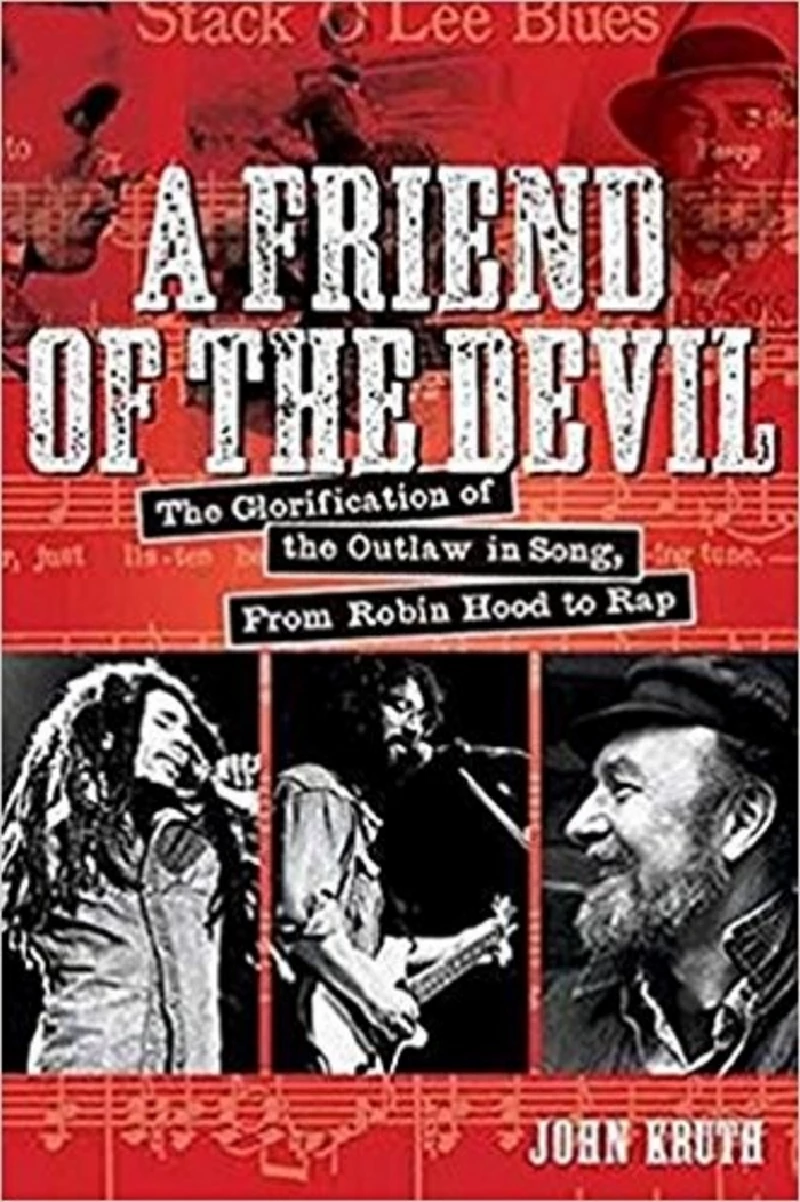Miscellaneous - A Friend of the Devil: The Glorification of the Outlaw in Song, from Robin Hood to Rap
by Kimberly Bright
published: 26 / 3 / 2018

intro
Kimberly Bright finds that musician John Kruth has an interesting historical take on the recurring theme of the outlaw in popular music from the Middle Ages to the present day.
The outlaw, as a long-standing major character in pop music, refuses to go away. John Kruth, an American songwriter and musician himself, has traced this phenomenon back to the medieval period in Europe and possibly further back in Africa and meticulously followed how the same types of characters keep popping up in defiant, anti-authoritarian, sometimes moralistic songs. The definition of an outlaw used here is somewhat vague. “Murder is a crime and a criminal is an outlaw, so where does one draw the line exactly"? Kruth asks. “Must there be a chase involved for the perpetrator to be an outlaw? Does the term imply that the offender must become a fugitive preceding arrest? Unfortunately the definition offered by Webster’s Dictionary will not end the debate. On one hand it describes an outlaw as "A person who has broken the law and who is hiding or running away to avoid punishment". While a little further down we read "One that is unconventional or rebellious", which throws the door wide open to ne’er-do-wells of every shape and stripe.” The reasons for the hero or anti-hero being sung about, becoming a criminal on the outskirts of society are complex,the most ethically acceptable reason is a populist, rebellious but honest sense of justice, like Robin Hood’s and a desire to covertly help the underprivileged who are ignored or oppressed by those in power. This type is a trickster who always manages to get away from authorities by the skin of his or her teeth and is easily romanticized in figures like the highwayman ( An evergreen staple of historical romance novels). The more psychopathic outlaws with poor impulse control who rob and murder for fun, adventure and personal gain, with no functioning conscience are less sympathetic. That is, unless they are incredibly good-looking, well-dressed and charismatic as well, in which case quite a lot can be forgiven by a listener. Kruth’s research is incredibly detailed, he traces the origin of many common folk songs, well past Harry Smith’s Smithsonian anthologies, such as 'Stagger Lee' and 'Black Jack Davy', to not only their first known compositions but to the actual historic accounts of real-life outlaws and their fates. He focuses more on folk roots in Britain, Europe and North and South America than elsewhere, with an excellent section on the tradition of Mexican narcocorridos, which continue to this day, glorifying famous drug lords and cartels. He fairly points out that a large percentage of classic murder ballads are about the death of a young girl ('Knoxville Girl', 'Pretty Polly', etc.), usually an unintentionally pregnant one. Kruth zips from one gangster and folk hero to the next rather quickly, usually with a good transition to the next engrossing story but not always. It is assumed that the reader has more than a nodding acquaintance with American geography and the history of country, folk, blues, rock, and rap music and those without this advantage will likely spend a lot of time with a browser tab open to Wikipedia. The spotty references and one anemic chapter devoted to hip hop are tantalizing arguments for rap being the obvious heir to the outlaw culture celebrated in older music genres. It would have been preferable if Kruth had dropped some of the obscure recent folk and indie rock songwriters and instead expanded on this topic the way he did with the chapters on Fela Kuti and the origins of Reggae. The book is an incredibly useful reference work, particularly the interviews with artists such as Dave Alvin, Richard Thompson, Steve Earle, and Dr. John. There is a helpful exhaustive playlist at the end of the book, which is incredibly useful but oddly arranged in alphabetical order by song title. It certainly points the way to a fun and informative rabbit hole for curious music fans from Brazil to Nigeria.
most viewed articles
current edition
Carl Ewens - David Bowie 1964 to 1982 On Track: Every Album, Every SongArmory Show - Interview with Richard Jobson
Bathers - Photoscapes 1
Colin Blunstone - Thalia Hall, Chicago, 16/7/2025
Visor Fest - Valencia, Spain, 26/9/2025...27/9/2025
Billie Eilish - O2 Arena, London, 10/7/2025
Robert Forster - Interview
Loft - Interview
John McKay - Interview
Editorial - July 2025
previous editions
Heavenly - P.U.N.K. Girl EPManic Street Preachers - (Gig of a Lifetime) Millennium Stadium, Cardiff, December 1999
Oasis - Oasis, Earl's Court, London, 1995
Beautiful South - Ten Songs That Made Me Love...
Trudie Myerscough-Harris - Interview
Pixies - Ten Songs That Made Me Love...
Prolapse - Interview
Doris Brendel - Interview
Simon Heavisides - Destiny Stopped Screaming: The Life and Times of Adrian Borland
Paul Clerehugh - Interview
most viewed reviews
current edition
Amy Macdonald - Is This What You've Been Waiting For?Sick Man of Europe - The Sick Man of Europe
Alice Cooper - The Revenge of Alice Cooper
Phew, Erika Kobayashi,, Dieter Moebius - Radium Girls
Davey Woodward - Mumbo in the Jumbo
Lucy Spraggan - Other Sides of the Moon
Blueboy - 2
Cynthia Erivo - I Forgive You
Philip Jeays - Victoria
Lapsley - I'm a Hurricane, I'm a Woman In Love
Pennyblackmusic Regular Contributors
Adrian Janes
Amanda J. Window
Andrew Twambley
Anthony Dhanendran
Benjamin Howarth
Cila Warncke
Daniel Cressey
Darren Aston
Dastardly
Dave Goodwin
Denzil Watson
Dominic B. Simpson
Eoghan Lyng
Fiona Hutchings
Harry Sherriff
Helen Tipping
Jamie Rowland
John Clarkson
Julie Cruickshank
Kimberly Bright
Lisa Torem
Maarten Schiethart